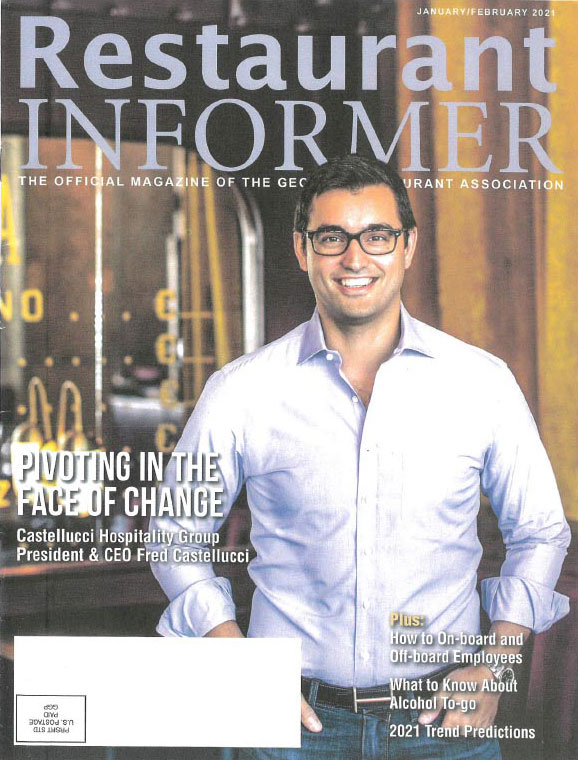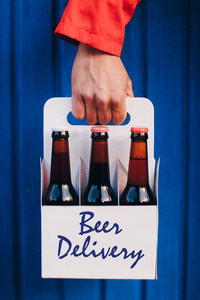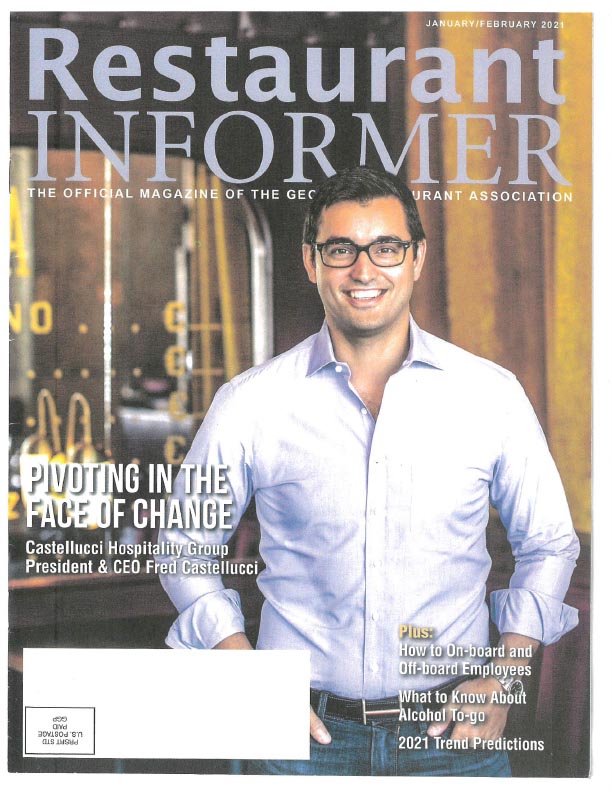February 19, 2021
By: D. Taylor Harper and Lisa F. Harper for Restaurant Informer. Read Original Article >

As of August 2020, restaurants can deliver alcohol, but there are things you need to do before launching this service.
To-go beer and wine have been some of the staple items that have allowed restaurants to make a profit during the pandemic. Now, thanks to a new law that passed earlier this year (HB 879), Georgia restaurant owners have the opportunity to permanently capitalize on takeout and delivery alcohol sales. Here’s what you need to know about adding alcohol delivery to your services.
HB 879 passed in July 2020 and became effective Aug. 3, 2020. The law allows certain licensed alcohol retailers, including restaurants, brewpubs, bars and other consumption-on-premises retailers to take advantage of the new privilege.
Be aware, however, that not all local jurisdictions allow consumption-on-premises licensees to concurrently hold a package beer/wine license. If your business is eligible, there is no need to obtain additional licenses/permits from the GDOR. Licensed alcohol manufacturers such as breweries and distilleries are still prohibited from alcohol delivery.


Who Can Deliver the Alcohol?
Not just anyone from your establishment can deliver the alcohol. The delivery person must be an employee of the alcohol retail licensee and must be 21 years or older with a valid Georgia driver’s license. A criminal background check must be conducted (with written consent of the employee). The person must have no more than 3 moving violations in the past 3 years, no major traffic violations within the last 3 years, and no convictions within the past 7 years for driving under the influence of drugs/alcohol. There can be no convictions of fraud, sex offenses or use of a motor vehicle to commit a felony crime, and the person cannot be on the National Sex Offender database. The employee also must complete a mandatory delivery training course approved by the GDOR. Alternatively, your establishment could engage a third-party delivery service. Keep in mind, though, that the third-party delivery service needs to meet the requirements just mentioned.
While as of right now, delivery drivers do not need additional permits to deliver alcohol by the GDOR, be sure to keep copies of the training certification in the delivery vehicle at all times or stored in an accessible format electronically. It’s important to keep records about your alcohol sales and delivery. The four main items to keep track of are:
- Criminal background investigation report
- List of employees and contractual agreements of third-party services delivering alcoholic beverages
- Employees’ training course certifications
- A record of the delivery recipient’s name and date of birth for a 3-year retention period. Such records would be provided to special agents or enforcement officers upon request.
Where and When Can the Alcohol Be Delivered?
Deliveries may be completed only within the local licensing jurisdiction and may not leave the boundaries of the local licensing jurisdiction. For example, an establishment licensed in the city of Atlanta can deliver anywhere within that jurisdiction, but an establishment licensed in unincorporated Fulton County may not deliver to an address within the City of Atlanta.
You can only deliver to consumers, not other licensees. Also, no deliveries are permitted to schools, dorms, prisons, reformatories or other correctional facilities, mailboxes, package shipping locations or storage facility businesses.
Restaurants can only deliver beer and wine in unbroken packages (the format the package came in from the wholesaler), meaning a bottle of wine or can of beer can only be delivered in the state it was received by the restaurant (unopened). At this time, mixed drinks and cocktails are not permitted to be delivered, but pre-packaged ready-to-drink cocktails (RTDs) are allowed.
Alcohol can be delivered anytime when sales of package beer and wine is permitted by the licensee’s local juristiction. All deliveries must be completed on the same day of the sale and the same day the alcoholic beverages leave the licensed premises of the retailer. For example, an order cannot be entered at 11:50 p.m. and fulfilled after 12:00 midnight.
Alcoholic beverages must be delivered to a person at the address specified in the order and cannot be left curbside. The drinks can only be delivered to a person who is 21 or older, presents proper ID verifying age and provides a signature that matches the identification. The person cannot be noticeably intoxicated.
Delivery drivers should not receive direct compensation (tips) for delivery of alcohol. Delivery drivers must allow the purchaser to inspect the delivered alcoholic beverages at the time of delivery. All sales of alcoholic beverages are final.
Third-party service providers cannot upcharge alcoholic beverages. The licensee must appear as the merchant of record at all times, including at the time of purchase and at the time of receipt of the delivery. For example, the bank statement must say the licensee’s name and not DoorDash, UberEats, Post Mates, etc. All payments for the sale and delivery of alcoholic beverages must be processed prior to the alcoholic beverages leaving the premises.
Types of Liability Related to Alcohol Delivery
There are three primary types of liability for alcohol delivery: regulatory, third-party and employer liability. Here’s some things to consider for each one:
Regulatory liability. According to the DOR, licensees are ultimately responsible for the delivery of alcoholic products from their licensed premises, including deliveries by employees of the retailer as well as third-party services. Illegal alcohol deliveries committed by an employee or a third party are deemed to be an act taken by the retailer.
So, from a regulatory standpoint, if something goes wrong in the delivery, the licensee will ultimately be the one who answers to the GDOR. Whether that regulatory liability will affect civil liability is another issue.
Third-party liability. The use of third-party independent contractor type delivery services has allowed many restaurants to keep serving food while their dining rooms have been closed and without investing in drivers themselves. Many believe that engagement of a third party protects them from liability, but there are some concerns when you use a third-party service.
Under long held law in Georgia, the determination of whether you are liable for the acts of your independent contractor has been largely based on the right that you retain to direct the time and manner of the work performed. So, in general, the fewer directions or requirements that you have a right to impose on the delivery service or actually do impose on the delivery service, the less likely that you, the restaurateur, will be liable for the acts of the delivery service. But you can also be liable for the acts of a third party whom you have engaged to perform a service, if what the third party is doing is a violation of a statute. And that’s where the new alcohol delivery regulations may meet the existing civil law and create liability for the restaurateurs.
As a result, the terms of the agreement between the delivery service and the restaurant, particularly in connection with alcohol delivery requirements and with liability to others and to each other, are of paramount importance. The new opportunity for alcohol delivery is also an opportunity, which restaurateurs should take, to review and potentially negotiate their contracts with the delivery services, particularly in the liability areas.
Employer liability for its own employees. Are you liable for the acts of your own employees if they deliver the alcohol? The answer is generally yes, if the employee is acting within the boundaries of his or her employment. This can be true even though the employee was not authorized or was forbidden to perform the particular act. However, if the employee’s conduct is entirely disconnected from the employer’s business and wholly personal (like driving somewhere on a lunch break), then generally the employer will not be held liable.
Thus, training of employees in the rules of alcohol delivery, as well as implementation of systems to monitor compliance and/or to demonstrate a record of compliance, are important to the protection of the restaurant in this alcohol delivery context, and frankly, in most employment contexts.
How to Best Protect Yourself from Alcohol Delivery Liability
Because the law is new, much remains to be seen as issues arise and are dealt with by the regulatory authorities and by the courts. Still, there are things that a restaurateur can do to better protect themselves. Among other things, talk with your insurance agent, your lawyer, and your human resources professional, and consider the following:
- Check your liquor liability policy. Don’t assume that your policy will automatically cover alcohol delivery. Some only cover issues with respect to on-premises consumption. Confirm what your policy does and does not cover and make sure it covers delivery services.
- Consider a non-owned automobile policy. These policies cover business liability arising from employees driving their own vehicles for business. Commercial liability policies frequently do not provide such coverage nor do employee personal policies.
- Review your Commercial General Liability (CGL) policy. Don’t simply rely on the fact that you have a CGL policy for coverage in connection with alcohol delivery-related incidents. Find out what your policy does and does not cover, because chances are it may not cover what you need in this instance.
- Review your third-party delivery service contracts. Determine who is liable if something goes wrong; consider requiring an indemnity from the third-party provider. Determine if the contract requires that the provider meet all the requisites of Georgia law for the delivery of alcohol, including requirements regarding drivers. And make sure third-party drivers are required to go through requisite training, screening, etc. Consider requiring third-party delivery services to carry insurance naming you as an insured. Monitor the delivery services who come to pick up orders from you and make sure that they provide proof of their relationship with you upon pick up (rogue delivery services you have no relationship with may pick up orders and you could be liable).
- Add to your employee handbook. Include the new policies and procedures for driving while on business, including rules for delivery of alcohol, in your employee handbook. Also include anti-discrimination, sexual harassment, and similar policies as well as use of alcohol and substance abuse policies in your employee handbook.
- Expand your pre-employment process. Add background checks and more vehicle record checks to your pre-employment process (with proper and legal consents) and consider initiating periodic checks for anyone who may be driving.
Alcohol delivery is a potentially profitable component to add to your business, but because it is new to Georgia, it will take time for some issues to be ironed out by regulatory authorities and courts. While the information in this article is meant to help you gain a better understanding as it relates to your restaurant delivering alcohol, the information is not legal advice and we strongly encourage and recommend that you consult with your trusted legal and financial advisors before making any decisions.

